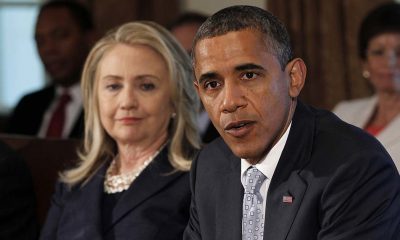World
US accuses Russia of harassing diplomats
 Washington: Washington has delivered high-level complaints to Moscow about accusations of increasing intimidation of American diplomats in Russia, the State Department said.
Washington: Washington has delivered high-level complaints to Moscow about accusations of increasing intimidation of American diplomats in Russia, the State Department said.
“We see an increase and we take it seriously,” State Department spokeswoman Elizabeth Trudeau told reporters at a press briefing on Monday.
Secretary of State John Kerry last discussed the matter with Russian President Vladimir Putin on March 24, CNN reported citing Trudeau as saying.
The spokeswoman said that harassment of diplomats by Russian security agents and traffic police had been an issue over the past two years but did not detail any incidents nor why Kerry brought up the matter with Putin.
Other Western embassies had reported the same behaviour toward their diplomats stationed in Moscow, Trudeau added.
Moscow, however, has charged that Washington has also engaged in problematic behaviour.
Last week, the Russian Foreign Ministry Spokeswoman Maria Zakharova said that Moscow has “felt a significant increase in pressure on the Russian Embassy and consulates general of our country in the US.”
According to Zakharova, staff members of Russia’s consulate missions abroad “regularly become the objects of provocations by the American secret services, face obstacles in making official contacts and other restrictions,” including travel.
Trudeau dismissed Russia’s claims of US harassment of its diplomats as “without foundation” and said American diplomats are faced with same restrictions as Russian diplomats under the terms of a reciprocal agreement.
The Putin-Kerry conversation came after Washington in January stripped five of six Russian honorary consuls of credentials to retaliate for harassment of its diplomats in Moscow.
In response, Russia’s Foreign Ministry accused the United States of provoking Russian diplomats in the US and elsewhere.
World
Lockdowns in China Force Urban Communities to Defy Censorship and Vent Frustration Online

Shanghai’s rich middle class is leading a wave of online dissent over the strict and prolonged lockdowns imposed in various parts of the country. Chinese internet censorship is struggling as patience is wearing thin in many urban centers, coming up with creative forms of online protests.
Social Media Posts Revealing Lockdown Tension in Shanghai
Drawn-out lockdowns are nothing new in China as authorities insist with the nation’s zero-Covid policy since the start of the pandemic. Currently over This time around, however, metropolitan areas like Shanghai are increasingly difficult to keep quiet, given that its more than 25 million residents have seen weeks of total isolation along with food shortages and many other service interruptions.
Dozens of towns and reportedly over 300 million Chinese citizens have been affected by lockdowns of different severity. As expected, urban netizens have been most outspoken over their difficulties by finding creative ways to get around state censorship and bans placed on topics, news comments and spontaneous campaigns.
Shanghai residents have been using mobile proxies and hijacking seemingly unrelated hashtags to talk about healthcare issues, delivery failures and the overall severity of their situation. The “positive energy” that the Chinese government wants to transmit during the recent prolonged series of lockdowns does not come naturally to those counting food supplies and online censors are working hard to filter words, trending topics and undesired social media sharing.
WeChat groups and message threads are under constant monitoring. Posts questioning the zero-Covid approach have been quickly deleted, including by leading Chinese health experts like Dr. Zhong Nanshan. Video footage is soon censored and protests and investigations are quickly made to disappear.
Where this has not worked, officials have exposed banners with warnings and outright threats like “watch your own mouth or face punishment”, while drones have been patrolling the city skies. Yet, if anything, this has led to further tensions and unspoken confrontation with Shanghai’s educated and affluent middle class.
Creative Online Solutions Harnessing Civic Energy
Announcements by Chinese social media that they would be publishing the IP addresses of users who “spread rumors” have not helped either. Tech industry research has shown that much of Asia’s tech-savvy population has a habit of using mobile proxies and other privacy tools, quickly finding workarounds to browse the internet freely and talk to the world about the hottest topics.
The sheer volume of forbidden posts is already a challenge for the very censorship system, experts explain. Unable to track all trending hashtags, state workers overlook topics that speak about the US, Ukraine or other popular news. Linking human rights elsewhere to their situation, Chinese online dissidents establish their informal channels and “hijack” the conversation to share personal or publicly relevant information about the Covid suppression in their town.
Sarcastic and satirical posts still dominate. Others hope to evade the censors by replacing words from famous poems or the national anthem. One thing is certain – social media, when harnessed with the right creativity, has proven its ability to mount pressure on the government in even some of the most strictly controlled tech environments like China.























